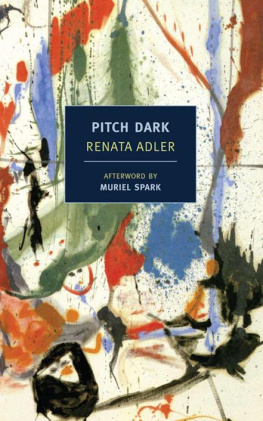
Copyright 2013 by Renata Calverley
All rights reserved.
You may not copy, distribute, transmit, reproduce, or otherwise make available this publication (or any part of it) in any form, or by any means (including without limitation electronic, digital, optical, mechanical, photocopying, printing, recording, or otherwise), without the prior written permission of the publisher. Any person who does any unauthorized act in relation to this publication may be liable to criminal prosecution and civil claims for damages. For information, write to Bloomsbury USA, 1385 Broadway, New York, New York, 10018.
This is a work of nonfiction based on the life, experiences, and recollections of Renata Calverley. In some cases names have been changed to protect a persons privacy.
Published by Bloomsbury USA, New York
LIBRARY OF CONGRESS CATALOGING-IN-PUBLICATION DATA HAS BEEN APPLIED FOR
eISBN: 978-1-62040-150-7
First U.S. Edition 2013
This electronic edition published in November 2013
Visit www.bloomsbury.com to find out more about our authors and their books.
You will find extracts, author interviews, author events, and you can sign up for newsletters to be the first to hear about our latest releases and special offers.
I dedicate this book to my husband, Bruce,
my daughters, Sarah and Kay, and the rest of my family
September 1939. 10, Jagielloska Street, Przemyl
Wake up, Renata! Wake up! Mamusias voice was urgent.
I turned over and started to pull the covers over my head. I didnt want to get up. I wanted my mother to go away and leave me alone. But Mamusia was already wrapping me up in her quilt. She lifted me out of bed and began stumbling along the long narrow corridor, past the kitchen and the bathroom and out of the apartment towards the stairwell. She hugged me tighter as we hurried down the two flights of stairs, past the big front door and on down towards the basement. Half awake now, I clung to her. I was afraid she would drop me on the hard floor. She had never run down the stone steps before. Hadnt she always told me never to run down the stairs?
You must always walk carefully, Renata, and hold the banister rail.
She had told me this over and over again even though the rail was well above my head and walking downstairs, holding on, was most uncomfortable. But tonight was different.
In the distance I could hear the sound of thunder big, loud crashes raging around us. It must be a bad storm, I thought, if we had to leave our home in the middle of the night and shelter in that dark, smelly basement. When we reached the cellar beneath our apartment block, our neighbours were already huddled together, wrapped in blankets, talking in low voices. Through the half-light I could see Babcia, my grandmother, amongst the ghostly faces but I couldnt find my father.
Wheres Tatu? I asked.
Darling, hes somewhere in Europe still, with the Polish Army, Mamusia said, sighing deeply.
Why? I asked.
Because theres a war on. As I told you before.
I clutched Rabbit tightly inside my quilted cocoon.
She placed me gently on the ground and stood up, turning her attention to our neighbours urgent whispers. No one had explained to me what war was. I pulled her quilt closer around me, tucking it back under my feet where its folds were letting in the cold autumnal air. I buried my face in its softness and surrounded myself with the recognisable smell of my mother. In the flicker of candlelight Mamusias quilt came alive. The familiar peacocks, embroidered with the multicoloured threads that I liked to pull when Mamusia wasnt looking, spread out like huge, colourful fans in hundreds of blues; their emerald-green eyes had all turned and were watching me.
It reminded me of the story of the giant with a hundred eyes who guarded the gates of a mysterious place called the Underworld. People went there when they died or had it been the giant who guarded a cow that belonged to a goddess and she had put each of his hundred eyes on the tail of her favourite bird, the peacock? I yawned. I couldnt remember I would have to ask Mamusia to tell me the story again. I wanted to hear all her wonderful stories again. The ones she told whilst getting ready to go out when I would sit at the foot of her bed on her dark blue velvet chaise longue, watching her.

Renata and her Mamusia, Tosia, before the outbreak of the Second World War
Do I look nice? she always asked me.
I would look at her smiling lips, her big brown eyes surrounded by a mass of shiny dark hair.
Oh, yes. You look beautiful, Id answer every time, as she finished putting on her make-up and straightening her hair, because she was. Mamusia was the most beautiful mother in the whole wide world.
In the flickering candlelight I felt myself being hushed back to sleep by the murmuring voices. I didnt resist because the peacocks were watching the darkness, protecting me from the crashes of thunder that raged outside.
When I awoke the next morning, I was back in my own little bed that stood in the corner of the living room. I looked round, trying to work out whether the events of last night were real or just a dream. The heavy table and matching chairs with their lion-paw feet were still standing in the middle of the room. The large sideboard crowded with silver ornaments still leaned against the wall. Across the room, the blue-and-white stove stood with its head touching the ceiling. I loved that stove with its heat and shiny tiles; some had little pictures on them of the countryside, others had flowers. I remembered how much Id wanted to touch the people with their funny pointed hats and strange clumsy shoes that Mamusia called clogs. I loved sitting near the stove with Mamusia while she told me stories and we ate bowls of wild strawberries and sour cream. Then came the moment when finally Babcia and Mamusia were out of the room at the same time and I ran over to touch those magical scenes. But the stove was hot and burned my fingers. I stuck my finger in my mouth to stop myself from crying. I never touched the stove again but I never stopped looking at the pictures.
The smell of Babcias cooking drifted through from the kitchen. It made me feel hungry so I called out to my grandmother. But it Mamusia who appeared in her bedroom doorway, the one between my bed and the stove. She smiled at me.
My little darling is awake, she said, lifting me out of bed, hugging me tight and planting a kiss on the top of my head. Its time for breakfast, sweetheart.
She didnt say anything about last night. The storm had passed and everything was just the same as before. It must just have been a bad dream.
But things werent the same as before. Mamusia and Babcia were the same, our house and the things we did every day remained the same. Mamusia still went out most days to her work. I would be left at home with Babcia and Marynia, my nanny. Marynia still took me out for my afternoon walk, even though my cousin Zazula didnt accompany us any more. Yet something had changed. I didnt know what.
At first it was little things, Mamusia and Babcia no longer laughed quite as much. They would often go quiet when I walked into the room and then start whispering when I left. Mamusia wrote a letter to my father every day. To begin with he used to write back, and Mamusia would lift me up and together we would sit at her writing desk. She would open the thin grubby envelopes and read aloud Tatus news, repeating his words once, twice, even three times. Then she would take her own thick cream paper from a small drawer in the front of the desk, pick up her black pen and write a reply. I would watch as her fingers guided the ink across the page leaving its trail of black loops, dots and squiggles that I could not understand. But now she would leave me playing with my toys and sit alone at her desk with a big frown on her face. She wrote letter after letter.
Next page






![Becky Doughty [Unknown] - Renata and the Fall from Grace](/uploads/posts/book/140017/thumbs/becky-doughty-unknown-renata-and-the-fall-from.jpg)


